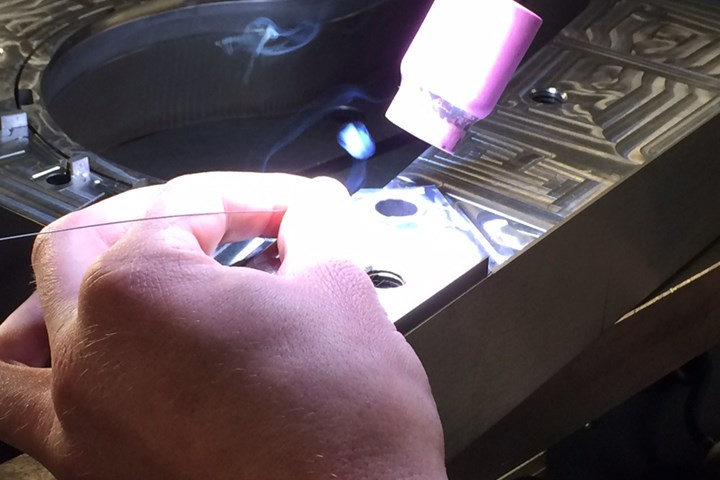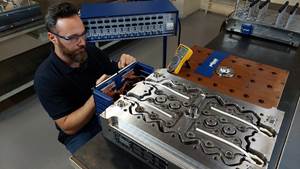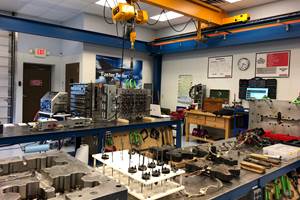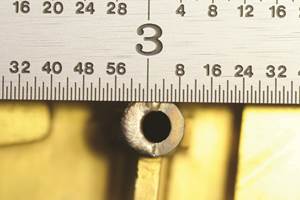Precision Laser Technology Offers Wide Range of Global Laser Engraving Services, Welding
Texturing, engraving, welding and direct part marking are just a few services PLT offers mold builders. An experienced team and enhanced technologies ensure unmatched quality, precision and speed.

Photo Credit: Precision Laser Technology
Service provider Precision Laser Technology (PLT) supports global mold builders with a wide range of laser services including texturing, engraving, welding and direct part marking. PLT also offers laser and Micro-TIG applications and staffs an experienced team knowledgeable in a wide range of tooling metals, alloys and corresponding fillet wires. PLT’s laser stations range up to 400 watts (W) and are optimized with multiple axes systems, boom extensions, CNC programming and tilting and swiveling optics in order to respond quickly to the next welding emergency that enters their doors.
Mold Engraving Services
PLT offers the etching of precision details and surface finishes for low and high cavitation molds. PLT can apply this service to tool steels (including hardened) aluminum (including QC10) copper (beryllium and Moldstar) and graphite. Engraving depth range from <0.001-0.125 in., with a tolerance of +/- 0.0005 in. Additional capabilities include sidewalls and contoured surfaces, 3D engraving, five-axis control, high cavitation and laser texture and polish.
Engraving detail options include:
- 2D and 3D logos and graphics
- cavity ID’s
- date codes
- recycle and material codes
- vent lines
- tool identification
Direct Part Making (DPM) Services
PLT permanently laser parts with product information including serial numbers, part numbers, date codes and barcodes, allowing for the tracking of parts throughout their life cycle. The company’s laser technologies can mark metals, plastics and surface-coated materials with increased marking speeds that yield shorter turnaround time and draw greater precision for enhanced quality. PLT’s DPM services meet NASA-STD-6002, MIL-STD-130 and ATF 27.CFR.478.92 industry compliance standards.
Anodized aluminum, for example, serves as a protective coating and hardener for fabricated aluminum parts. As an add-on, the ability to dye the anodized layer offers a contrasting backdrop for laser markings. PTL’s laser technology is programmed to remove the anodized coating and aluminum oxide to expose the material's surface. The interaction between the laser and the aluminum creates a bleach white mark that is highly visible against black and other colored anodizing.
Marking stainless steel is achievable using the proper laser source and power settings to provide a dark contrasting mark that is highly visible. Varying grades of steel respond differently and yield distinct shades of black. If desired, a permanent pigment could be introduced to provide color enhancement for a darker shade.
For applying aesthetic, permanent features on plastic, laser marking has become an alternative from existing printing and silk-screening applications. Within the plastic, the laser's radiation is absorbed by the polymer and converted to a thermal energy. Given the vast portfolio of plastic make-up, this thermal energy will react in a variety of marking fashions on the surface.
In addition to plastic, aluminum and steel, this service can be applied to copper, brass, titanium, wood, acrylic, zinc and rubber. Marking detail offerings include 2D and 3D, barcodes, logos and graphics, product data, lot and date codes and serialization.
Laser Welding
PLT offers laser deposit welding services for the repair of mold components. The company’s laser welding systems are equipped with tilt adjusting optics allowing the laser beam to target vertical surfaces and complex areas with reduced set-ups. PLT’s laser welding technology maintains a low energy beam to a precise heat-affected zone. The localized heat and rapid cooling process minimizes any thermal overload to the work piece and excludes the need for pre-heating.
With the use of different pulsation methods and low heat control, PLT also provides precise laser beam control for spot welding and micro joining of advanced materials. Its automatic welding operations make for efficient production processes with higher control and repeatability.
Types of tool material for laser welding include S7, H13, P20, 420 SS, 440 SS, A2, D2 and M2, aluminum (including QC10), copper (including Moldmax and Moldstar) and ELMAX.
PLT also provides a mold repair form for a streamlined process.
Precision Laser Technology Team
Further, PLT’s core values of quality and service are embraced by an experienced, dedicated team that possess the training and knowledge to ensure a successful, timely and well-communicated weld repair.
PLT maintains a staff of highly qualified technicians to provide immediate solutions and recommendations to your engraving needs. Their service and support team additionally provide same day cost estimates and lead times; technical telephone support; project consultation; graphic enhancement and proofs; and engraving samples for customer assessment.
Related Content
5 Hot Runner Tips for Moldmakers and Molders
Best practices for initial hot runner tryouts and effective preventive maintenance.
Read MoreWhat You Need to Know About Hot Runner Systems and How to Optimize Their Performance
How to make the most out of the hot runner design, function and performance.
Read MoreLaser Welding Versus Micro Welding
The latest battle in finely detailed restoration/repair of mold materials.
Read MoreThink Safety: Eliminate Hazards Throughout the Shop
The tooling community is taking advantage of new products for safer mold shops and molding facilities.
Read MoreRead Next
Are You a Moldmaker Considering 3D Printing? Consider the 3D Printing Workshop at NPE2024
Presentations will cover 3D printing for mold tooling, material innovation, product development, bridge production and full-scale, high-volume additive manufacturing.
Read MoreReasons to Use Fiber Lasers for Mold Cleaning
Fiber lasers offer a simplicity, speed, control and portability, minimizing mold cleaning risks.
Read MoreHow to Use Strategic Planning Tools, Data to Manage the Human Side of Business
Q&A with Marion Wells, MMT EAB member and founder of Human Asset Management.
Read More









.jpg;maxWidth=300;quality=90)












